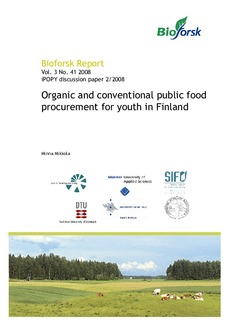| dc.description.abstract | Public catering in Finland has strong historical roots from the 19th century, connected with the rise of the national state, industrialisation, democracy and modern times in general. The school meal system developed hand in hand with work place meal services, and inherently the aim was to offer lateral support for workers' and pupils' activities by healthy and wholesome nutrition. The public catering had initially a strong label of welfare services and implied economical use of ingredients.
Later on, the character of public service of the welfare state was emphasised, as public catering was perceived as a way to promote equality between citizens. The public meal system, and school meal system as part of it, represented not a self-evident and 'natural' developmental path, but can be seen as a result of extensive political, economic and organisational efforts, even fights. Further on, the nutritional and cultural orientations were strengthened when the public school meal system was made a statutory free service for all pupils, first in basic education, and later in secondary education. Today the Finnish welfare state meets the challenge of greying societies and decreasing labour force, and the school meal system, as all public provision systems, in confronted with the trend for increased efficiency and economical operations, including food procurement. Even within these restrictive organisational environments, there is interest in environmentally friendly food and sustainable development by public caterers, municipal officials and politicians of all parties. While the conventional meal system is the prevailing one, there are also movements towards sustainable catering in hundreds of schools around Finland, connected to Education for Sustainable Development (ESD) program.
The report is produced within the project “innovative Public Organic food Procurement for Youth”, iPOPY, and will be updated and revised during the project period (2007-2010). | nb_NO |
